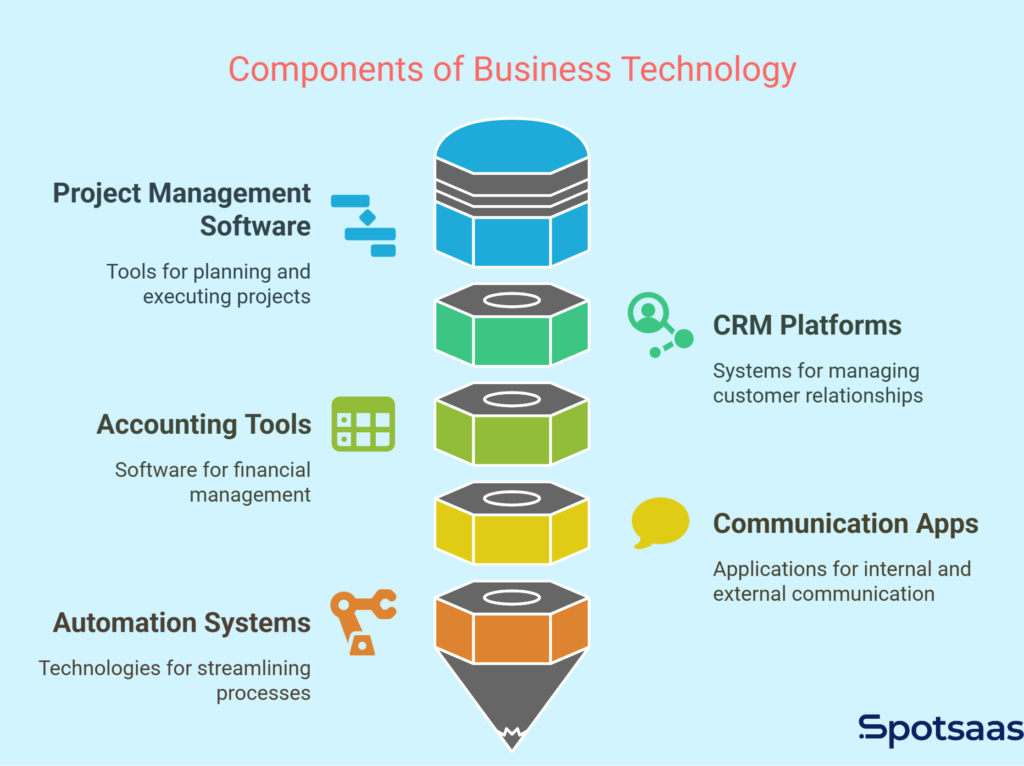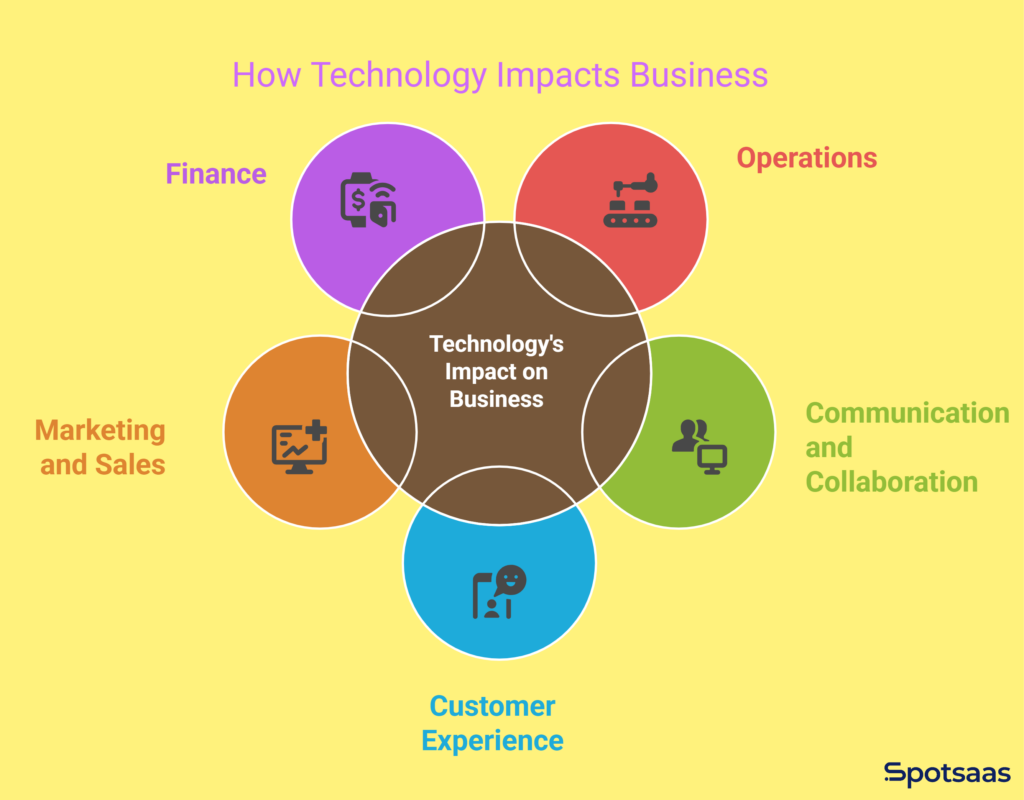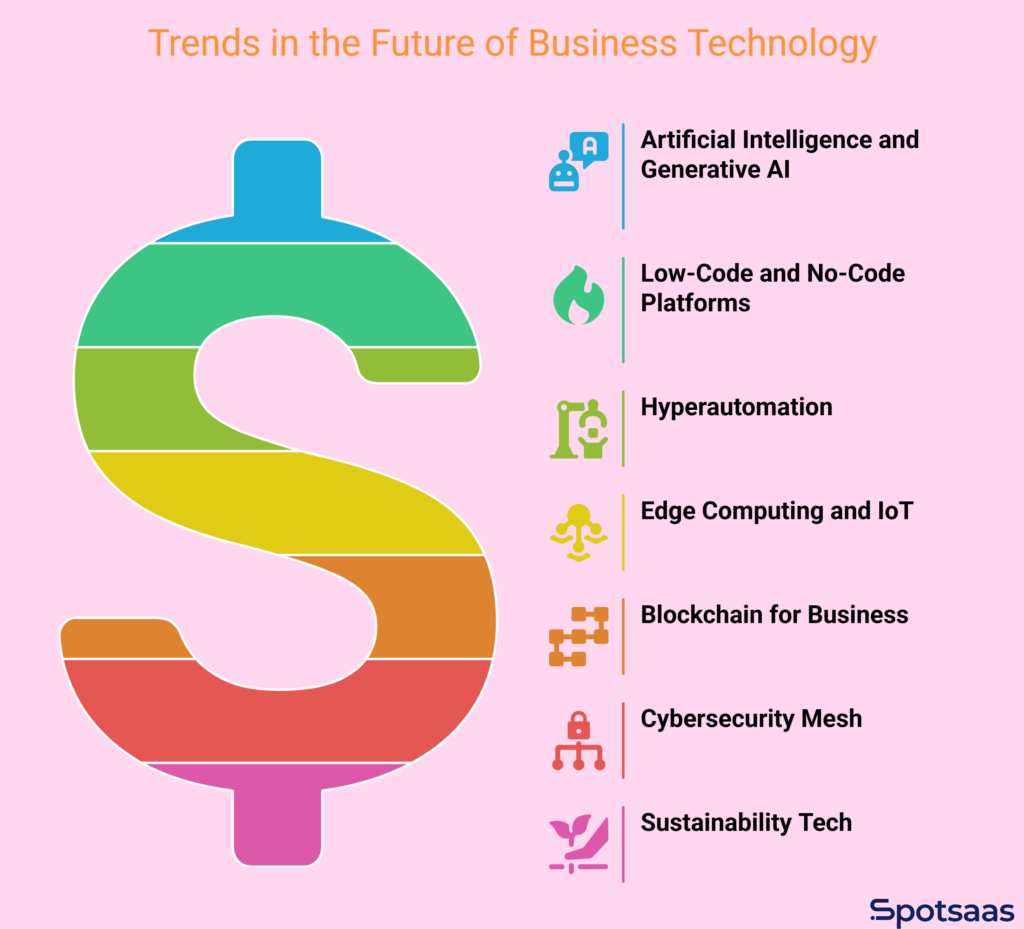Business technology is no longer a nice to have. It’s a key part of how companies operate and grow. From software tools to cloud platforms and automation systems, the right tech can make everyday work faster, easier, and more effective.
For anyone leading a business or managing operations, understanding how technology fits into the bigger picture isn’t just helpful. It’s a smart move. It can improve productivity, support smarter decisions, and help you stay ahead of the competition.
If you’re thinking about investing in new tools or upgrading your current setup, this blog will give you a clear, practical view of how technology shapes modern business and how it can work for yours.
Key Takeaways
- Business technology is essential for modern operations and sustainable growth.
- The right tools can boost efficiency and simplify daily business tasks.
- Tech supports better decision-making across all teams and functions.
- Staying competitive today requires a smart, flexible tech strategy.
- Investing in technology can directly impact business success and scalability.
What is Business Technology?
Business technology refers to the tools and systems that help companies work smarter. It includes everything from project management software and CRM platforms to accounting tools, communication apps, and automation systems. These technologies support daily tasks, improve teamwork, and provide insights that guide better decisions.
Today, even small businesses can access affordable, cloud-based tools that were once limited to large enterprises. This shift levels the playing field and makes it easier to compete. The key is choosing solutions that align with your business goals and can grow with you.

Common Examples of Business Technology
The right business tools can simplify operations, improve collaboration, and support growth at every level. Here are some of the most valuable technologies companies use today.
- Project Management Tools like Asana and Trello help businesses organize work, manage deadlines, and improve team coordination. They’re ideal for keeping everyone on the same page, especially in fast-moving environments.
- Customer Relationship Management (CRM) Systems Tools like Salesforce and HubSpot help track leads, manage customer interactions, and personalize communication. They make it easier to build stronger relationships and close more deals.
- Accounting Software and Finance Software Applications like QuickBooks and Xero streamline tasks such as invoicing, expense tracking, and financial reporting. They help businesses stay organized and make smarter financial decisions.
- Communication Platforms Apps like Slack and Microsoft Teams make it easy to chat, share files, and hold virtual meetings. They keep teams connected and productive, no matter where they’re working from.
Benefits of Business Technology
Using the right technology can completely change how a business runs—from internal workflows to how customers experience your brand.
Below are some of the key benefits that show why investing in business technology is more than just a trend—it’s a strategic move.
Increased Efficiency
Business technology helps automate repetitive tasks, speed up processes, and eliminate unnecessary steps in daily operations. Whether it’s auto-generating reports or scheduling tasks, tools allow teams to focus more on high-impact work.
This saves time, reduces manual effort, and helps the business operate with more precision. Over time, these gains compound into faster delivery, lower costs, and smoother operations across the board.
Better Collaboration
Modern collaboration tools like Slack, Microsoft Teams, and shared cloud platforms make it easy for teams to stay connected. Whether people are working in the same office or across different time zones, communication stays seamless.
These platforms help reduce email clutter, encourage quicker feedback, and support document sharing in real time. Better collaboration means fewer delays, stronger alignment, and better project outcomes.
Smarter Decision-Making
With analytics and reporting tools, businesses can access real-time insights that drive informed decisions. Instead of relying on guesswork or outdated reports, leaders can track performance, monitor trends, and spot opportunities early.
This data-driven approach reduces risk and helps teams focus on what works. It also enables faster reactions to changes in the market or customer behavior.
Scalability
As a business grows, so do its needs. Scalable technology ensures you don’t have to rebuild your systems every time you expand.
Cloud-based platforms, modular software, and flexible tools make it easier to add users, features, or functions without starting from scratch. This allows businesses to grow confidently, knowing their tech can keep up without slowing them down.
Improved Customer Experience
Technology allows businesses to meet customers where they are—whether that’s through live chat, personalized emails, or seamless online purchases. Tools like CRM systems store customer preferences and history, making every interaction feel more tailored.
Faster response times and smoother support processes build trust and loyalty. When the customer experience is consistent and convenient, it leads to higher satisfaction and repeat business.
How Technology Impacts Business
Technology is deeply woven into how modern businesses operate. It influences team collaboration, customer interactions, decision-making, and every step in between. When used strategically, technology does more than just support the business it actively improves it.

Operations
Automation tools help reduce repetitive tasks, minimize delays, and improve process flow across departments. This leads to faster turnaround times and better resource management.
From inventory tracking to workflow automation, operations become more efficient, allowing businesses to scale without adding extra overhead.
Communication and Collaboration
Tools like Slack, Microsoft Teams, and Zoom help teams stay connected—whether they’re in the office or working remotely. These platforms support real-time messaging, file sharing, and meetings, creating a more unified work environment. The result is stronger teamwork, faster feedback loops, and fewer bottlenecks in day-to-day tasks.
Customer Experience
CRM systems and AI-driven tools allow businesses to deliver personalized, timely support across channels. Automated responses and smart insights help teams understand customer needs and respond quickly. This leads to more meaningful interactions, higher satisfaction, and stronger customer loyalty.
Marketing and Sales
Technology makes it easier to connect with the right audience through targeted email campaigns, social media tools, and data analytics. Businesses can track engagement, refine messaging, and improve conversion rates based on real-time insights. These tools help maximize marketing spend and bring in qualified leads more consistently.
Finance
Financial software supports budgeting, forecasting, and expense tracking with precision. It simplifies accounting processes and provides real-time visibility into cash flow. By reducing the chance of errors and improving reporting accuracy, tech allows finance teams to make confident, data-backed decisions.
Human Resources
From recruitment platforms to performance tracking systems, technology has reshaped HR. It simplifies hiring, automates onboarding, and helps track employee development. This improves the overall employee experience and frees HR teams to focus on strategy instead of paperwork.
Challenges of Business Technology
While technology brings big advantages, businesses often face a few challenges when adopting and managing it.
These challenges aren’t roadblocks—they’re areas that need the right strategy, planning, and support to navigate effectively.
Integration with Existing Systems
Many businesses already rely on legacy systems for day-to-day operations. Introducing new technology can be difficult if it doesn’t integrate smoothly with what’s already in place. Poor integration can lead to fragmented data, duplicated work, and process disruptions.
To avoid this, businesses should look for tools with open APIs or strong third-party integration options. Taking the time to align new tech with current workflows can lead to a more connected and efficient system overall.
Employee Adoption and Training
Even the most advanced tools are only useful if employees know how to use them effectively. When new platforms are introduced, there’s often a learning curve that can slow down productivity in the short term.
Without proper training and support, teams may resist change or underuse key features. Building in time for onboarding, offering hands-on guidance, and getting feedback early can lead to faster adoption and stronger long-term results.
Managing Costs and Subscriptions
With so many tech tools available, it’s easy to subscribe to more than you actually need. Monthly fees add up, especially if tools overlap in functionality.
Businesses should regularly audit their software stack to identify unused or redundant platforms. Choosing scalable solutions and focusing on ROI ensures tech investments are tied directly to business value, not just convenience.
Data Security and Privacy
As more business operations move online, protecting sensitive data becomes a top priority. Every new tool introduces potential entry points for cyber threats or accidental data exposure.
Companies need to be proactive about choosing secure platforms, following best practices, and educating employees about data handling. Staying compliant with privacy regulations also builds trust with customers and partners.
Keeping Up with Change
Technology moves fast, and today’s solutions can quickly become outdated. Businesses need to keep an eye on emerging tools, updates, and shifting customer expectations.
Falling behind can lead to missed opportunities or inefficiencies. By building flexibility into their tech strategy and regularly reviewing what’s working, businesses can stay competitive and responsive in a changing landscape.
Trends Shaping the Future of Business Technology
Technology isn’t standing still—and neither are the businesses using it. New tools and innovations are changing how companies operate, compete, and grow. Here are the key trends shaping the future of business technology and what they mean for real-world adoption.

Artificial Intelligence and Generative AI
AI is becoming a core part of everyday tools, from chatbots and recommendation engines to data analysis and content creation. Generative AI tools can produce reports, automate replies, and even generate marketing copy.
This helps businesses save time, scale faster, and offer more personalized experiences. As these tools become more accessible, companies of all sizes can leverage AI to boost productivity without needing in-house expertise.
Low-Code and No-Code Platforms
Building apps no longer requires a full team of developers. Low-code and no-code platforms like Airtable, Webflow, and Bubble allow non-technical teams to create internal tools, customer portals, or automations in less time.
This speeds up innovation and gives teams more control. It’s especially valuable for small businesses looking to move quickly without heavy tech investment.
Hyperautomation
Hyperautomation goes beyond basic automation by combining AI, machine learning, and robotic process automation (RPA) to streamline entire workflows. It’s used to automate complex, multi-step processes like onboarding, billing, or data validation.
Businesses that adopt hyperautomation can reduce costs, increase speed, and improve accuracy across departments. It’s a step toward building a more self-operating business model.
Edge Computing and IoT
Edge computing allows data to be processed closer to the source like on a device or sensor—rather than relying solely on the cloud.
This speeds up performance and supports real-time decision-making, which is especially useful in industries like manufacturing, logistics, and retail. Paired with IoT devices, it enables smarter operations, predictive maintenance, and faster service.
Blockchain for Business
Blockchain is evolving beyond cryptocurrency. It’s being used to secure transactions, validate contracts, and improve transparency in supply chains.
Businesses benefit from increased trust, data integrity, and reduced friction in processes like payments, audits, and recordkeeping. While still emerging, it’s gaining traction in industries like finance, healthcare, and logistics.
Cybersecurity Mesh
As businesses grow more digitally connected, cybersecurity strategies are becoming more flexible. A cybersecurity mesh architecture decentralizes protection, so every device, platform, or endpoint has its own layer of defense.
This is especially important for remote teams and cloud-based businesses. It allows companies to scale without compromising on data protection.
Sustainability Tech
Technology is also driving better environmental performance. Businesses are using carbon tracking software, energy-efficient data centers, and digital solutions to reduce paper waste and emissions.
Similarly, sustainable technology is addressing water waste through digital water management to conserve energy.
Customers increasingly expect brands to act responsibly, and sustainability tech helps companies align with those values while also cutting operational costs.
How Businesses Can Adapt
Business technology continues to evolve, and adapting to it doesn’t mean overhauling everything at once. Instead, it’s about making thoughtful, strategic moves that align with where your business is and where you want it to go.
The table below offers a quick comparison of key actions businesses can take to successfully adopt new technology.
It breaks down each step, the tools commonly used, who should be involved, and the impact it can have on your operations. Whether you’re planning a new rollout or refining your current setup, this table gives you a clear, actionable overview to guide your next move.
| Action | Tools | Who’s Involved | Impact |
|---|---|---|---|
| Define Clear Goals | KPI trackers, planning boards | Leadership | Focused investments, clear direction |
| Choose Scalable Tools | Cloud software, modular platforms | IT, Ops | Flexible growth, cost control |
| Train Employees | LMS, tutorials, live sessions | HR, Team Leads | Faster adoption, fewer tech headaches |
| Secure Your Systems | Encryption, access control | IT, Compliance | Data safety, customer trust |
| Review Performance | Dashboards, reports | Finance, Execs | Smart decisions, proven ROI |
| Involve the Team | Demos, surveys, pilot runs | Department Leads | Better fit, higher engagement |
| Plan the Rollout | Project boards, timelines | PMs, IT | Smooth transition, less chaos |
Start with Clear Business Goals
Before bringing in any new tech, take a step back and ask: What specific problem are we trying to solve? Is the goal to speed up processes, improve customer service, or increase sales?
Having well-defined goals helps you choose tools that solve real challenges, not just look impressive on paper. It also gives you a benchmark to measure results, making it easier to evaluate ROI and justify future investments. Tech should always support the bigger picture—not distract from it.
Choose Scalable, Flexible Tools
Not all technology grows well with your business. That’s why it’s smart to choose tools that are modular, cloud-based, and easy to expand or adapt. This gives you the flexibility to start small, test what works, and build from there without switching platforms later.
Whether it’s adding new team members, opening new locations, or expanding online, scalable tools help your systems grow without slowing you down. Flexibility also protects your investment, reducing the need for costly migrations.
Prioritize Employee Training and Support
Even the best software can fall flat if people don’t know how to use it. Successful tech adoption depends heavily on your team. That’s why it’s important to offer more than just a product demo create space for hands-on training, provide resources like videos or how-to guides, and encourage feedback.
When employees feel supported and involved, they adopt tools faster and more confidently. A well-trained team is not only more productive but also more likely to uncover new ways the tech can benefit your business.
Focus on Data Security from the Start
Every new tool you bring in handles some form of sensitive data—whether it’s customer information, financial records, or internal documents. That makes data protection a must from day one.
Choose software providers with strong security credentials, encryption protocols, and privacy policies. Set up user permissions, use two-factor authentication, and ensure regular backups. Prioritizing security not only reduces risk, but also builds trust with customers, partners, and your own team.
Stay Informed and Open to Change
Technology doesn’t stand still—and neither should your business. Keeping up doesn’t mean chasing every trend, but it does mean staying aware of new tools, updates, and shifts in your industry.
Set aside time each quarter to evaluate your tech stack and identify gaps or outdated tools. Encourage your team to share feedback and insights from their daily work. A culture that stays open to change is better equipped to adapt quickly, stay competitive, and take advantage of new opportunities.
Conclusion
Business technology is no longer optional it’s a growth tool. From smoother operations to better customer experiences, the right tools help you work smarter and stay competitive.
The key is choosing solutions that align with your goals and scale with your business. Start small, stay focused, and keep your team involved. With the right approach, technology doesn’t just support your business—it pushes it forward.
For businesses exploring the latest software solutions in 2024, find them on our SaaS marketplace.
Frequently Asked Questions
What is Business Technology?
Business technology refers to tools, software, and systems that help companies run more efficiently. It improves productivity, customer experience, and decision-making.
How does tech help small businesses?
Business technology gives them access to powerful tools once limited to big companies. This helps them stay competitive and scale faster.
What challenges should I expect?
Common issues include integration, training, cost tracking, and security. With planning and support, these can be managed effectively.
How do I choose the right tech?
Start with your goals and pain points. Involve your team, try pilot programs, and choose tools that offer long-term value.



